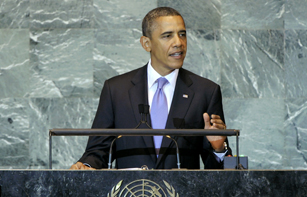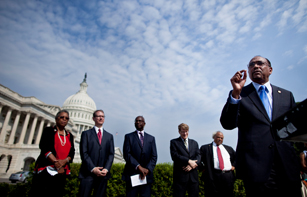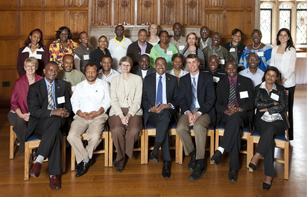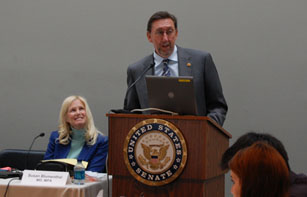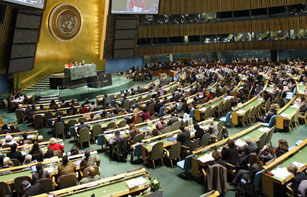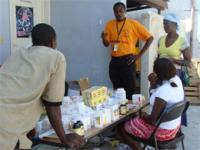UNAIDS speaks with organizations in North America and Europe to better understand patterns of human rights violations and the connections to health

Caption Credit: UNAIDS
The recent suicides among gay teens in the United States of America (USA) after bullying and cruel treatment because of their perceived sexual orientation highlights the fact that homophobia continues to exist in all societies. Despite acceptance in popular culture in many countries, young lesbian, gay, bisexual and transgender people (LGBT) can face some of the same barriers presented by stigma and discrimination as previous generations.
“Violence against members of the LGBT community is unacceptable, no matter where in the world it occurs,” Michel Sidibé said UNAIDS Executive Director. “Governments must fulfill the rights of all people, regardless of sexual orientation and gender identity.”
A public opinion poll conducted in the USA in May this year found that while more than half of Americans believed that gay and lesbian relationships were acceptable, 43% still feel that such relationships are morally unacceptable.
“Clearly homophobia remains a serious problem in the United States, but I think we’re heading in the right direction—just not quickly enough,” says Chris Collins, Vice President and Director of Public Policy for the American Foundation for AIDS Research (amfAR).
In the wake of recent anti gay-violence, a USA faith alliance called on the Universal Church to work to “end the violence and hatred against out lesbian, gay, bisexual, and transgender brothers and sisters.”
Institutional homophobia is easier to pin-point as discriminatory, such as punitive laws criminalizing same sex behaviour. However negative attitudes towards members of the LGBT community can exist even when protective laws are in place, and these are more difficult to address.
University student Emily Carson, a member of the Global Youth Coalition of HIV/AIDS, is from Connecticut, a state which has protective laws. Growing up in a small conservative town Ms Carson said she was harassed and bullied for years, because she was perceived as different. When first hearing about the suicides among gay teens in the US, Ms Carson said she was heartbroken. She had hoped schools had gotten better.
Violence against members of the LGBT community is unacceptable, no matter where in the world it occurs
Michel Sidibé, UNAIDS Executive Director
But Ms Carson also has a different worry: “Every few years this happens (gay kids committing suicide or the political cycle of the gay marriage debate), and people start talking about anti-homophobia. I worry that this public outcry is going to die down until the next time something happens,” she said. “We need to pay attention to this on a daily basis, not only when there is a tragedy involved.”
Social change requires more than legal reform, and the situation is similar in Europe. German-born Alex Müller, a board member of the International Lesbian, Gay, Bisexual, Transgender and Queer Youth and Student Organization (IGLYO), agrees: “On the one side there is legislative progress in Europe, but at the same time homophobic perceptions prevail in all parts of society.”
Reported hate-crimes on the rise in Europe
The number of reported hate-crimes against LGBT people have increased over the last few years in European countries according to the European Region of the International Lesbian, Gay, Bisexual, Trans & Intersex Association (ILGA Europe)—but these reports are considered the tip of an iceberg by the organization.
On the one side there is legislative progress in Europe, but at the same time homophobic perceptions prevail in all parts of society
Alex Müller, a board member IGLYO
“All our member organizations agree that there is a very high rate of under-reporting of hate-crimes,” says Joel Le Deroff, Policy and Programmes officer at ILGA Europe. “The paradox is that a high number of incidences reported, usually means that there is confidence between the law enforcement agencies and the victims.”
That is why it is difficult to know if this trend in increasing number of cases reported represents an actual increase in the number of hate-crimes committed, or a positive change in the environment which promotes the reporting of abuse. One thing that Mr Le Deroff is certain of is that the LGBT community should work together with law enforcement agencies. This to establish the trust needed for people who experience discrimination and violence based on their sexual orientation to report it.
Protective laws and social change
In Denmark, a country generally considered progressive and liberal with regards to sexuality, very little is known about the extent and character of hate crimes against members of the LGBT community according to a recent report by the European Union Agency for Fundamental Rights.
In 2007 a Danish LGBT online portal conducted a survey among their users on whether they had experienced hate crimes on grounds of their sexuality. Of the 9473 respondents, 12% stated that they had experienced physical assaults and 39% reported verbal assaults.
Steffen Jensen, spokesperson for international policy of the Danish National Association for Gay Men, Lesbians, Bisexuals and Transgendered People noted: “the general attitude towards minorities is shifting towards a less tolerant one. We need broad public awareness campaigns, basic information to everybody, and most importantly: education!”
Homophobia and health
The stigma and discrimination that results from homophobia affects whether or not members of the LGBT community are able to seek and obtain the health services that they need. The social marginalization of people who engage in same-sex relationships acts as a barrier to access HIV prevention, treatment, care and support services.
Prevalence of HIV among men who have sex with men and transgender people is almost always higher than the general population. In France, for example, men who have sex with men have an estimated HIV prevalence that is nearly 100 times higher than the national average.
According to Mr Collins from amfAR, homophobia has important implications for both the physical and mental health of LGBT people. A recent study in the USA showed that among LGBT adults people who had experienced strong rejection by their families were 3.4 times more likely to have risky sex and 8.4 times more likely to have tried to commit suicide as compared to people with supportive families.
Political leadership vital
Homophobia can also lead to unwillingness on part of political leaders to invest in the health of men who have sex with men, transgender people and other gender variant individuals.
A study in Italy from 2005 found that one third of the gay male respondents found it difficult to find information about which sexual behaviors carry risk of HIV infection. A majority of the respondents did not identify as gay to their doctors, and one in three was afraid that they would receive worse treatment from health workers because of their sexual orientation.
When the Italian parliament rejected the bill, it sent a message to us that hate-crimes were not part of the political priorities and that homophobia is legitimate
Joel Le Deroff, ILGA Europe
In 2009 a bill was put before the Italian Parliament to expand provisions for punishing hate crimes and incitation to hatred based on race, ethnicity, or religion to cover crime motivated by homophobia or transphobia—this bill was rejected. The United Nations High Commissioner for Human Rights declared it a step back for human rights in Italy.
“When the Italian parliament rejected this bill, it sent a message to us that hate-crimes were not part of the political priorities and that homophobia is legitimate,” said Mr Le Deroff from ILGA Europe.
It’s clear that the connections between human rights violations, homophobia and health are many. The nuances and different levels of discrimination ranges from the most blatant institutional discrimination outlawing same sex behavior, to not disclosing sexual orientation to a health care professional for fear of ridicule. To ensure an environment where people can live, work and love safely, governments need not only to fulfill and protect the rights of people within LGBT community, but also promote these rights.
UNAIDS is committed to empower all people, regardless of sexual orientation, to protect themselves from HIV infection and for all people living with HIV who need it to fully access antiretroviral therapy. This means ensuring that law enforcement agencies and the judicial system protects the rights of all people, including members of the LGBT community. It also means tackling homophobic sentiments that block an effective response to HIV, wherever such sentiments may exist.




